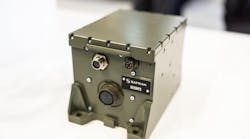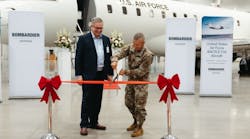Serious Fraud Office launches investigation into defense companies’ activities
By Annie Turner
LONDON - Western Europe has a great tendency to purse its lips and look sanctimonious when the word corruption is mentioned. The most recent naming and shaming of the world’s 16 most corrupt nations was topped by Chad and Bangladesh, followed by Turkmenistan, Myanmar (formerly Burma), Haiti, Nigeria, Equatorial Guinea, Ivory Coast, Angola, Tajikistan, Sudan, Somalia, Paraguay, Pakistan, Kenya, and the Democratic Republic of Congo. This is according to Transparency International and a think-tank at the University of Passau in Berlin.
None of these is a big surprise and all seem distant from the developed, rich world.
It’s something of a kick in the pants to find the United Kingdom’s biggest defense group, BAE Systems, under the microscope, accused of corruption. The U.K.’s Serious Fraud Office (SFO) is investigating alleged “substantial” payments made to a South African official close to the landmark offset deal made in 1999 and discussed in the November 2006 edition of this column.
South Africa’s organized-crime investigation unit, known as the Scorpions, has been asked to help. The allegations revolve around the then Defense Minister Joe Modise (who died in 2001) and his special adviser, Fana Hlongwane, a successful businessman who is a director of a South African arms company, Denel.
Former Minister Modise has been accused, posthumously, of accepting a bribe of almost a million dollars (500,000 pounds) from BAE, plus $10 million from a German consortium that was to supply submarines. It is said that Minister Modise decided that price would not be a significant factor in the decision-making process, opening the door to the BAE’s more expensive proposal.
All of this would be dodgy enough on its own, but it comes hard on the heels of British Prime Minister Tony Blair suddenly closing an SFO enquiry just before Christmas into BAE’s dealings in Saudi Arabia. The SFO was investigating allegations that BAE had paid bribes to members of the Saudi Royal family.
At the beginning of December, it was suggested that Saudi Arabia has given Britain 10 days to halt a fraud investigation into the country’s arms trade or lose the $19.5 billion Eurofighter Typhoon jet fighter contract. Whether this is true or not, Blair told the SFO to back off in the interests of national security, although the general belief is that it was more likely to be in the interests of the economy and national-defense champion BAE.
Shrieks of outrage followed this decision, obviously from Blair’s many domestic political enemies, but also from other governments and indeed, toward the end of January, the decision concerning the Saudi Arabian fraud investigation will have to be explained to the Organization for Economic Cooperation and Development (OECD), which is having a large-scale sense-of-humor failure about the whole thing.
Then it turns out that the SFO is also on the case with BAE’s activities in Chile, the Czech Republic, Romania, and Tanzania.
All of this is tricky stuff. No one but an imbecile would imagine that mega-deals are made without some greasing of palms, from relatively innocent, if expensive, dinners, and weekends away to discuss the details to commissions paid into foreign banks accounts for services rendered. BAE has already said that it had originally intended to pay as much as 12 percent of the South African deal’s total worth in commissions, but reduced this to 7 percent after discussions with British authorities.
The entire episode has done little to help the image of what is commonly referred to as the arms trade nor of the Labour Government whose Chancellor of the Exchequer and Prime Minister Presumptive, Gordon Brown, made such promises about ethical foreign policy and trade on Labour’s watch.
Black sites
In September 2006, President Bush admitted what had been suspected for a long time-that the CIA had been running a program to transport and interrogate senior members of Al Qaeda away from the public gaze. In January, the BBC broadcast reporter Nick Hawton followed the trail of these prisons, looking for so-called black sites, from Morocco to Poland and Romania.
Poland is a staunch U.S. ally with fighting forces in Iraq and Afghanistan, although involvement in these conflicts has sharply divided Polish public opinion. Romania, which has just joined the European Union, along with Bulgaria, is also suspected of providing black sites. The Polish government will not reply to questions about providing black sites for the CIA, including those put by the European Parliament. What is certain, however, is that Poland is enjoying the benefits of multibillion-dollar offset deals from the U.S. and the promise of up to $6 billion in investment into the country. No wonder Romania was so keen to become a member of the European Union and NATO.
At the time the Polish deal was struck in 2003, Ivan Eland, a military analyst at the Washington-based Cato Institute, a free-market policy group, commented, “The Poland arms deal is corporate welfare at its finest. The companies are private enterprises, but they are in effect wards of the state when the U.S. government supports and underwrites the deals.”
The French group Dassualt Aviation, as well as the British and the Swedish defense ministers, were furious that Washington’s support helped seal Lockheed Martin’s sale of 48 F-16 fighter jets to the Poles. Critics questioned Poland’s need for the planes and other equipment, while the French in particular saw the Poles’ decision as a betrayal of its neighbors, who had just welcomed the former Soviet Bloc country into the EU.
No doubt behind closed doors, the need to compete against U.S. aerospace and defense companies, backed by Washington, will be wheeled out as justification for BAE’s alleged actions and predicament.
Severe cuts to the British Royal Navy are likely to mean that two new aircraft carriers, promised in 1998, might never be built and that the order for eight advanced air defense Type 45 destroyers will be trimmed to six. It is anticipated that six of the Type 22 frigates and two Type 42 destroyers will be mothballed to save money. Many in the British defense establishment are grumbling that the French and Dutch now have superior navies to the once invincible British fleet.


